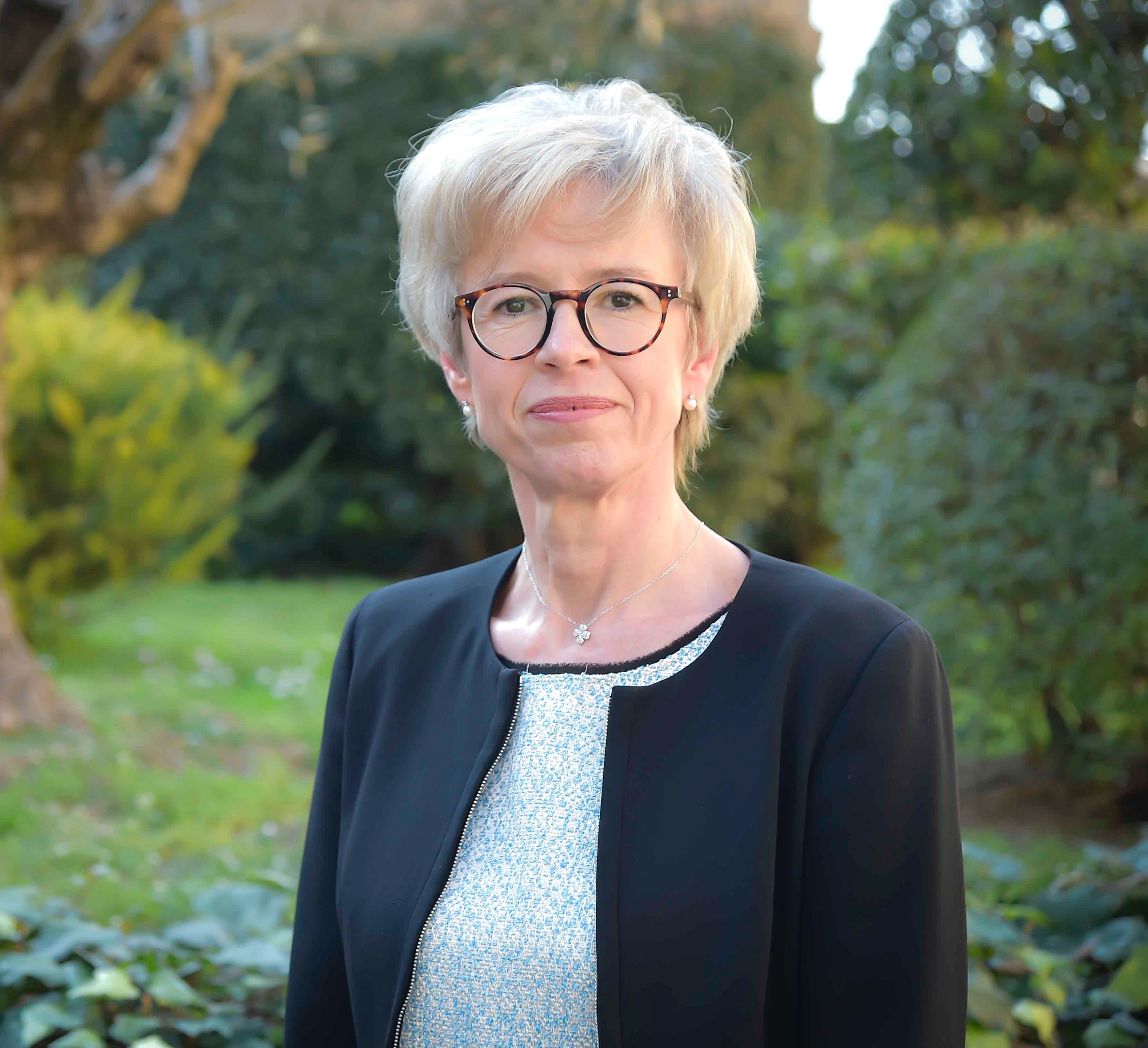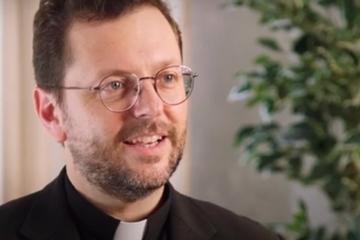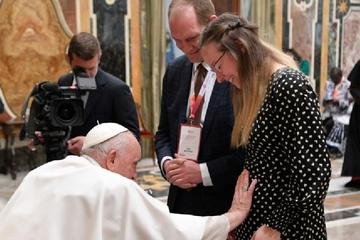
Dr. Linda Ghisoni, under-secretary for the lay faithful at the Dicastery for Laity, Family and Life since 2017, talks to us about her studies, work and the role of the laity in the Church.
Your studies range from philosophy, theology and canon law to the laity in the Church. Could you tell us about your academic choice, as well as the importance of studying at a pontifical university and the challenges posed by those studies?
My decision to study theology and philosophy coincided with my rediscovery of the faith, along with a question about what I wanted to do in life. I never would have thought of studying canon law, but I met some students from the faculty of canon law at the Pontifical Gregorian University who spoke to me about their studies, which I found very appealing. I was also looking for a field of study that would give me an opportunity to possibly work in the Church. This all led me down the path of canon law. I did not have a clear idea about future work opportunities. After all, at that time in Italy, the ecclesiastical courts did not offer job opportunities to lay people, but I thought I could work as a rotal advocate (a canon lawyer authorized to practice before the Tribunal of the Roman Rota). Quite frankly, I entrusted myself to the fact that I liked this particular field of study, to my intuition and to divine Providence, which I have experienced very concretely at various times in my life. Looking back, I must acknowledge with gratitude that my expectations and hopes have always been exceeded.
The choice of a pontifical university was mandatory for the course of study I was undertaking, but I soon realized the Pontifical Gregorian University allowed me a unique experience: I immediately felt at ease in an open, international context, full of stimuli and challenges in the cultural, linguistic, academic and spiritual levels. I met students from around the world and I established good friendships, some of which have grown over the years and, often, have been sources of help and support, providing incentives to improve. I broadened my horizons. I benefited from my Jesuit professors of great depth, who with sobriety, passion and rigour passed onto us an interest in the subject matter, as well as a method and a style applicable in various contexts. Their example and personal care contributed to what I define as integral formation.
I will never forget the words of Father Urbano Navarrete, the director of my licentiate thesis and subsequently of my doctoral dissertation: “The training you received at the Gregorian is the best letter of introduction you could have. It will work and bear fruit.”
Over the years, the formative opportunities I received at the Gregorian have been many, constantly updated in line with the evolving ecclesial situations. I was accompanied with great respect along my academic path. I found my commitment was worthwhile and everything I had studied gradually acquired meaning.
How did your studies and research at a pontifical university relate to the work you are doing currently?
For 20 years, I worked in the ecclesiastical tribunals carrying out various duties, from notary to judge. My studies at the Gregorian in canon law regarding marriage were fundamental for such work, along with my diploma as a rotal advocate from the Studium of the Tribunal of the Roman Rota.
My work since 2017 at the Dicastery for Laity, Family and Life requires competencies in several areas, in part juridical-canonical, if I think about the work the dicastery is called to carry out in accompanying the life and development of associations of the faithful recognized by the Holy See. In part, however, it is a question of reflecting on the laity — both men and women — on their vocation, formation and mission in the Church and in society. In this case, a theological-ecclesiological vision with a pastoral focus is required, always within the scope of the specific competencies of a dicastery of the Holy See.
It is a challenge that involves the ability to face diverse issues. I realize that, beyond the individual disciplines I studied, the method I acquired at the Gregorian makes all the difference and connects the formation I received during my studies with my work today.
In our post-COVID world and considering the pope’s appeal to promote greater integration of the lay faithful, especially women, in areas of responsibility in the Church (as presented in the pope's speech in October 2020), could you tell us about the progress made by the Church in this respect? Furthermore, what advice would you give young lay people who are interested in studying in Rome today and who wish to make a difference within the Church in the future?
Many things have changed since I started working in the ecclesiastical courts 25 years ago. Today, there is a greater presence of lay faithful, especially women, in various areas of the Church. At that time, there were no female judges in the courts in Italy, while today there are many women who hold that office, although not in all countries. There has also been transformation in the pontifical universities. Today, there are numerous women professors who teach theology, some of whom are heads of departments. However, this is not the case everywhere. Much remains to be done to promote the presence of women, not on the basis of an equal division of quotas, but because their contribution is truly rich and effectively impacts relationships and work in the Church.
My advice to young women, interested in studying in Rome today and wishing to make a difference in the Church in the future, would be to invest in their formation, particularly in the subjects they choose to study, because quality always bears fruit. I also recommend making the most of their time at the pontifical universities, to breathe that internationality which refers to the universality of the Church. Finally, I recommend cultivating a spiritual life which is a fundamental ingredient towards nourishing one's sense of belonging to the Church.
In an article published by Catholic News Service (click to read), about child protection policies, you stated: “A bishop cannot think that questions regarding the church can be resolved by him acting alone” or only with other bishops. “Every member of the Church is called to work together to ensure that children are safe.” What is the importance of the role of the laity in the Church, at the decision-making level?
To answer this question, it is necessary to return to baptism and the gift of the sensus fidei, that is, to that “spiritual instinct,” which allows believers to recognize whether a given teaching or a certain practice is in accordance with the Gospel and the apostolic faith. Pope Francis also calls it “the smell of the sheep.” Let us not forget that, as we read in a document of the International Theological Commission of 2014, “In certain areas, the teaching of the Church has developed as a result of lay people discovering the imperatives arising from new situations. The reflection of theologians, and then the judgment of the episcopal magisterium, was based on the Christian experience already clarified by the faithful intuition of lay people” (“Sensus fidei in the Life of the Church,” 73).
If we reason based on this premise, and not merely on sociological premises, it is evident how the involvement of lay people — with their unique contribution and guided by their “instinct of faith” — is indispensable for the ecclesial body in decision-making contexts.
Dr. Linda Ghisoni was born in Cortemaggiore, Piacenza, Italy, in 1965. She is married and the mother of two daughters.
She obtained the “Vordiplom” in philosophy and theology at the Eberhard-Karls-Universität in Tübingen (1991); a doctorate in canon law from the Pontifical Gregorian University (1999); the diploma for rotal advocates from the Studium of the Tribunal of the Roman Rota (2002) and the diploma in administrative practice from the Congregation for Divine Worship and the Discipline of the Sacraments (1994).
At the tribunals of first instance and appeal of the Diocese of Rome, she has worked as a notary (1997-1999), defender of the bond (1999-2002), auditor (2002-2005) and judge (2005-2017); with the Holy See she has served as deputy defender of the bond at the Tribunal of the Roman Rota (2003-2009), deputy commissioner for defense of the bond in causes for the dissolution of valid unconsummated marriages at the Congregation for Divine Worship and the Discipline of the Sacraments (2006-2011) and, since November 2011, at the Tribunal of the Roman Rota.
From 2013 to 2016, she collaborated with the Pontifical Council for Laity as specialist of laity studies in the Church.
On 7 November 2017, Pope Francis appointed her as undersecretary of the Dicastery for Laity, Family and Life.
In 2018, she was appointed by the Holy Father as consultor of the Congregation for the Doctrine of the Faith and commissioner for the dissolution of marriages “in favorem fidei.”
She is the author of scientific publications in the field of canon law, and since 2011, she has been an invited lecturer at the faculty of canon law of the Pontifical Gregorian University.
Photo courtesy Dr. Linda Ghisoni


